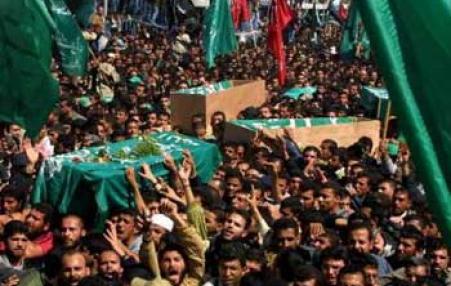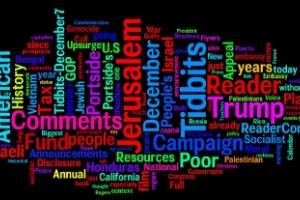The Road to Hell in the Middle East - Gearing Up for the Third Gulf War
TomDispatch
 Since World War II Israel and its pre-state paramilitary organizations have assassinated more people than any other country in the Western world - some 2,300 "targeted killing operations," most of them against Palestinians, but also aimed at Egyptians, Syrians, Iranians and others. In the name of state security, Israeli officials didn't just walk the line of legality, they trampled it.
Since World War II Israel and its pre-state paramilitary organizations have assassinated more people than any other country in the Western world - some 2,300 "targeted killing operations," most of them against Palestinians, but also aimed at Egyptians, Syrians, Iranians and others. In the name of state security, Israeli officials didn't just walk the line of legality, they trampled it.
 Reader Comments: Jerusalem Catastrophe - Jewish Voice for Peace; IfNotNow; New Israel Fund; GOP Tax Plan Biggest Increase in American History; Portside's Annual Fund Appeal; Flynn's Guilty Plea...and Trump; Honduras; California Built on Genocide; Resources - 50 years since 1968 and Vietnam War; Announcements - Poor People's Campaign; The Socialist Upsurge in the US
Reader Comments: Jerusalem Catastrophe - Jewish Voice for Peace; IfNotNow; New Israel Fund; GOP Tax Plan Biggest Increase in American History; Portside's Annual Fund Appeal; Flynn's Guilty Plea...and Trump; Honduras; California Built on Genocide; Resources - 50 years since 1968 and Vietnam War; Announcements - Poor People's Campaign; The Socialist Upsurge in the US
 In November 1917, British foreign secretary Lord Arthur Balfour declared British support for “the establishment in Palestine of a national home for the Jewish people”; in December, Jerusalem fell to British troops, and the effects of these events continue to reverberate. The Balfour Centennial should be a time of somber reflection about global responsibility for the tragedy in Palestine, which is more than a local record of colonial crimes, severe as these have been.
In November 1917, British foreign secretary Lord Arthur Balfour declared British support for “the establishment in Palestine of a national home for the Jewish people”; in December, Jerusalem fell to British troops, and the effects of these events continue to reverberate. The Balfour Centennial should be a time of somber reflection about global responsibility for the tragedy in Palestine, which is more than a local record of colonial crimes, severe as these have been.
Spread the word